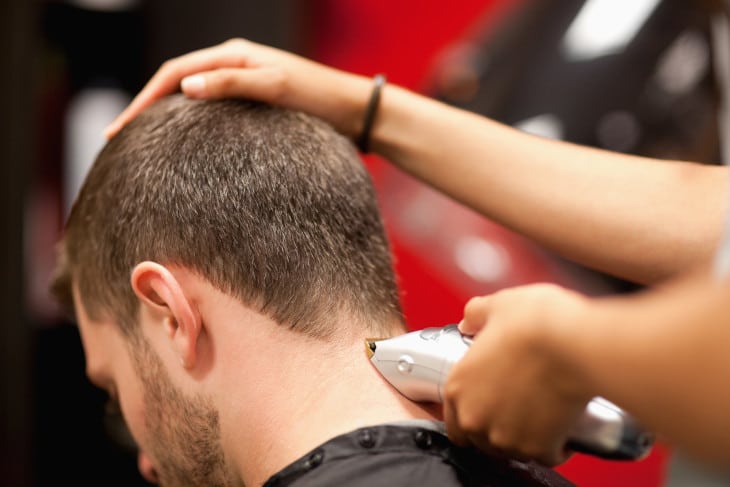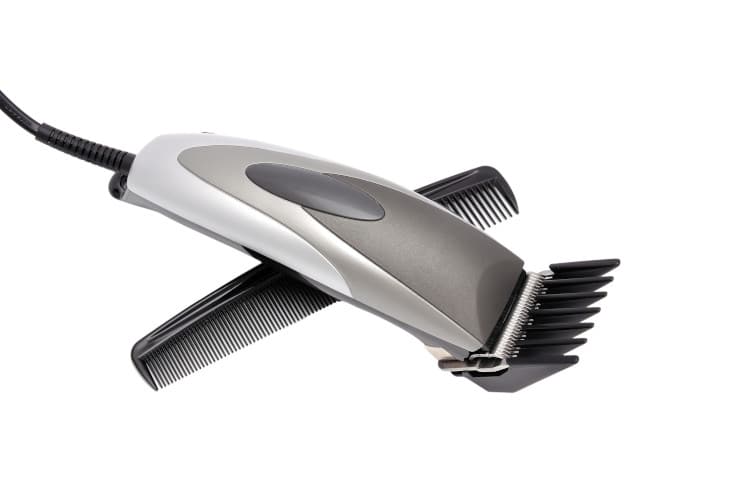Nothing compares to the self-sufficiency of being able to cut your own hair at home—and when you first picked up that great set of clippers, chances are they came with a tiny tube of clipper oil.
This lubricant is a must-have for maintaining the sharpness of your clipper blades, but once it runs out, what are you to do?
You can buy more clipper oil, of course, but we all get forgetful sometimes! That’s when knowing which materials can work as clipper oil substitutes can come in handy.
In this post, we’ll go over a quick list of the top alternatives to clipper oil, each with their pros and cons, as well as a few ingredients and products that you may want to skip.

What You Should Look for in a Clipper Oil Substitute
These are the basic effects you should look for in a clipper oil alternative, to ensure it’ll be an adequate replacement.
Lubricating. Oils are slick and slippery, which is why they’re so good at lubricating metals. A good substitute will offer just as much slip as a dedicated clipper oil, to reduce the friction and heat that cause the blades to go dull. That’s incredibly important, because the sharpness of your blades determines how effectively you can create specific trims (and that’s especially true if you’re using your clippers for fades and other looks that are difficult to deliver).
Light. A great clipper oil should have low viscosity, meaning that it should be very fluid at room temperature. Heavy oils with a thicker texture are not so great because they can build up and get a little “goopy”. Use even a little too much, and they can attract grime and dirt, and may even clog and slow down your blades.
Chemically Stable. Have you ever smelled old cooking oil that sat in the back of a drawer for too many years? If you remember a weird, plasticky smell, that’s a sign that your oil went rancid because of exposure to oxygen. Since clipper oil sits on your clipper blades in the open air, the last thing you want is for it to “spoil,” which is why it’s so important to choose a clipper oil that is chemically stable and cannot oxidize.
Skin-Safe. Finally, your oil substitute should be skin-safe, cosmetic grade, and free from chemicals that may irritate the skin. That protective layer on the blades will come in contact with your skin, so you don’t want to use an oil that might irritate, especially if you accidentally cut yourself.
So now that you know what we’re looking for in our quest for a great clipper lubricant, here are the best clipper oil alternatives.
Mineral Oil: Pros and Cons as a Substitute
Mineral oil, also known as paraffin, is a liquid byproduct of the petroleum industry. This may sound a little icky, but mineral oil undergoes a serious level of refinement before it’s sold to consumers, so it should be free of contaminants that can harm human health.
Mineral oil is the best clipper oil replacement for a simple reason—it’s usually the exact same thing. Most clipper oils sold by the leading brands are made of simple white mineral oil.
When searching for mineral oil that you can use on your clippers, we recommend looking specifically for products marketed as either cosmetic grade, food grade, or USP. USP is actually the safest choice since it means that mineral oil was manufactured and tested according to the U.S. Pharmacopeia standard, making it a medical-grade ingredient.
Make sure to avoid heavy mineral oils or any mineral oil that’s marketed for industrial use.
The Pros of Mineral Oil
Identical. Mineral oil is identical to clipper oil, so you’ll know that it’ll work just as well.
It’s everywhere. It’s very easy to find in stores, especially in the first aid section.
Can be medical-grade. There are medical-grade options which are great if you’re nervous about contamination, although we think cosmetic and food-grade mineral oils are also a good choice.
The Cons of Mineral Oil
Petroleum byproduct. Mineral oil is a petroleum industry byproduct, which some folks may wish to avoid altogether as a sustainability practice.
Can be confusing. Shopping for it can be a little confusing (especially online) since there are so many different types of mineral oils.

Baby Oil: Pros and Cons as a Substitute
Baby oil is another good oil substitute. It’s basically a cosmetic-grade mineral oil blended with fragrance, and sometimes a bit of vitamin E or trace amounts of other oils.
Some brands produce natural baby oils without mineral oil. Since they’re usually plant oil-based, they might not be stable enough to use as a clipper oil substitute—at least not regularly.
The Pros of Baby Oil
Accessible. You can find baby oil easily in every drugstore or grocery store.
Nearly identical. Baby oil is very similar to clipper oil, but just with added fragrance and a bit of vitamin E. You can expect very similar performance.
Smells nice. Because of the added fragrance, baby oil just smells a little more luxurious, which can make it more fun to use.
The Cons of Baby Oil
Risk of irritation. For some guys with very sensitive skin, fragrances can be irritating, so what’s pleasant for some can be an issue for others. Keep this in mind when shopping for your baby, as well!
Watch out for other formulas. Some baby oils, usually from natural brands, are made with vegetable oils instead of mineral oil. Watch out for them, because they’re more likely to go rancid on the blade.
Silicone Oil: Pros and Cons as a Substitute
Silicone oil isn’t technically an oil, but it does have a very fluid, silky texture and it does a good job of protecting clipper blades from moisture and friction. Like mineral oil, it’s also sold at various grades including food grade and cosmetic grade. It’s often recommended as a treadmill machinery lubricant, but in a pinch it’ll work well as a lubricant for clipper blades.
The Pros of Silicone Oil
Mild. Silicone oil is very gentle and mild, so you can feel safe using it on your skin. It’s usually safe for the skin on your head, as well, so it can be safe if you’re using clippers to shave your head (although, of course, as with all of these, you’ll want to check with a medical professional if you have concerns).
Great texture. If you don’t like handling greasy materials, you’ll love silicone oil. It has a unique silky texture that’s fluid and slippery without being oily.
The Cons of Silicone Oil
Viscosity can be an issue. The different silicone oils can really vary in texture and fluidity. You’ll have to watch out for thick or viscous silicone oils, since they can gum up your blades.
Harder to find. Silicone oil is much harder to find in stores, especially since you’re looking for cosmetic or food grade.
Stable Cosmetic Oils: Pros and Cons as a Substitute
In recent years, a lot of brands started releasing stable, non-oxidizing cosmetic oils like squalane which is usually derived from sugar cane, and MCT oil or caprylic/capric triglyceride which is usually derived from coconuts.
These oils are usually pretty expensive compared to the other options we’ve suggested, but if you’d prefer to avoid petroleum byproducts, they could be a good alternative.
The Pros of Cosmetic Oils
Light and stable. Stable cosmetic oils offer great lubrication because they’re lightweight and unlikely to go rancid.
Petroleum-free. If you’d prefer to use a natural alternative to mineral and silicone oils, these stabilized oils are the way to go since they’re derived from natural ingredients.
The Cons of Cosmetic Oils
Fairly expensive. Compared to mineral oil, these cosmetic oils usually come in smaller sizes so they cost more per ounce.
Not as stable. While squalane and MCT oil are relatively stable, they’re not quite as stable as mineral oil. If you leave your clippers packed away for months at a time, oxidation may be an issue.

Substitutes We Don’t Like as Much…!
What about WD-40 or coconut oil? The truth is that there are a lot of oils that we don’t like as much for oiling our clippers. Here they are, along with the reasons why we don’t recommend them.
Vegetable Oils
Coconut oil, olive oil, sunflower oil—we’ve seen all sorts of vegetable-based cooking oils recommended for lubricating clipper blades. These oils do have some benefits, since they’re skin-safe, natural, and affordable, and chances are you already have them sitting around in your kitchen.
However, using vegetable oil isn’t a great idea. Oils like olive and sunflower oil can go rancid pretty quickly with exposure to air and moisture. Coconut oil is a little more stable, but it’s too solid at room temperature so it’s more likely to clog up your blades.
If it’s just a one-off situation, using vegetable oil isn’t a big deal (and it’s better than nothing), but we definitely don’t recommend it for the long term.
Coolant Spray
Lubricating coolant sprays like Andis Cool Care or Oster 5-in-1 Spray are fantastic, but they’re not substitutes for clipper oil. These aerosol sprays have two major functions: They disinfect and cool your blades.
Spraying some on immediately after you’ve used your clippers is great for keeping your blades clean and in good shape. We highly recommend buying a spray like this, especially if you also use your clippers on other people.
The issue is that while coolant sprays do offer some lubrication, it’s just not enough since they’re at least 60% alcohol. If you try to use one without also oiling your blades, you may find that their performance declines faster than you expected. That’s why most barbers recommend still following it up with clipper oil.
WD-40
Of all the industrial materials out there, WD-40 probably isn’t the worst thing that can come in contact with your skin. However, it’s still a machine oil that’s not regulated or tested for human skin. As WD-40’s Material Safety Data Sheet makes clear, prolonged contact with the skin can lead to irritation. Needless to say, we don’t think having it layered over the sharp blades of your clipper is a great idea.
Sewing Machine Oil
We’ve seen some sources recommend using sewing machine oil on clippers, and we can understand why. Sewing machine oil is made from mineral oil, so it’s basically the same as clipper oil, right? As it turns out, not quite.
The big difference here is that sewing machine oil is made for machines, with no intention that it’ll ever come in contact with human skin. It doesn’t have to undergo the same purification and refinement process as cosmetic or USP mineral oil, so there’s a risk that it’ll contain trace contaminants that could harm your skin. That’s not a risk worth taking when skin-safe mineral oil is so easy to find.
Well-Maintained Clippers Are Happy Clippers
Now that you know what you can and can’t use to oil up your clippers, you should have no trouble maintaining them for years to come. Remember—it’s all about choosing light, stable oils that you wouldn’t mind having come in contact with your skin. Happy clipping!
Michael Morris is the head writer here at Rough and Tumble Gentleman. He's got a ducktail beard and loves Brazilian jiu-jitsu. He's married to the woman of his dreams and lives in Brooklyn, NY.



